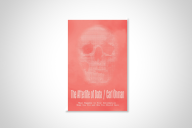You have /5 articles left.
Sign up for a free account or log in.
It's only October, but already you can feel the nip of holiday commercialism in the air. That's especially true at the big chain stores for cultural goods, where the public-domain Dickens books and the discount CDs of Bing Crosby are now on display, priming the pump for seasonal cheer.
And making your way to the checkout counter, you might notice a new title positioned for maximum impulse-buying convenience: A small book called Festivus: The Holiday for the Rest of Us, by Allen Salkin, published by Warner Books.
Late last year, Salkin wrote an article for The New York Times about how some people now celebrate the "Seinfeld"-spawned faux tradition. More precisely, they (or rather, we) invite friends over to Festivus gatherings in early December -- in lieu of the regular Christmas, Hanukkah, or Kwanza parties. In the course of his reporting, Salkin learned about the Festivus party my wife and I have held in early December for some years now. He gave me a ring to discuss it.
Evidently this interview took place not long after I had downed a large cup of strong coffee -- for I distinctly recall doing a prolonged riff on how Festivus was a postmodern variant of the British social historian Eric Hobsbawm's concept of "invented tradition." This is an exercise known as "bullshitting." You could read a book about it.
None of my improvisation, alas, ended up in Salkin's article. (Nor was there any reference to my effort to add to the Festivus traditions by making the song "Now I Wanna Be Your Dog" by Iggy and the Stooges into a carol.)
Anyway, a couple of months after the piece ran, Salkin was back in touch. He had just gotten a contract to do a book on Festivus, and wondered if I might write up certain aspects of my rant for inclusion as a short essay.
Well, the book is now out. And the essay is in there ... but now in a form much abbreviated. The reference to Eric Hobsbawm, for example, has been removed. (A grievous omission, though it's possible that the great man would prefer it that way.) Some degree of cutting is to be expected. But what did come as a surprise was, rather, the addendum: A sarcastic little item running alongside the piece, scoring easy points off its "overintellectualization" of the holiday. (As though that were not a tendency the essay itself is mocking.)
It seems, in short, like a very curious way to repay someone who contributed his work for free. Then again, free-floating rancor was always the dominant tone on "Seinfeld."
In any case, I've retained rights to the essay, and am running the full text of it here, in the hope that this version be considered definitive by scholars in the field of Festivus studies. If any...
---------------------------------------------------------------------------
Each year, my wife and I invite friends to gather around the aluminum pole -- or at least the place it would be, if we ever got around to buying one -- and discuss the True Meaning of Festivus. Of course it's gotten so commercialized now. But Festivus is here to stay. After long cogitation (too long, probably) I've concluded that there is more to it than an excuse for non-religious seasonal holiday. Festivus is the postmodern "invented tradition" par excellence.
Admittedly, the phrase "postmodern 'invented tradition' " is something of a mouthful, but there is a more or less serious historical argument behind it. Let's see if I can make it with a straight face.
Once upon a time -- let's call this "the premodern era" and not get too picky about dates -- people lived in what we now think of as "traditional societies." Imagine being in a village where few people are literate,
everybody knows your name, and not many people leave. A place with tradition, and plenty of it, right?
Well, yes and no. There are holidays and rituals and whatnot. As spring draws near, everybody thinks, "Time for the big party where we all eat and drink a lot and pretend for a few days not to notice each other humping like bunnies." (That one was a big hit even before New Orleans was on the map.)
And yet people don't say, "We do X because it is our tradition." You do X because everybody else around here does it -- and as far as you know, they always have. Not doing it would be weird, almost unimaginable.
But then, starting maybe 300 years ago, things got modern. We tend to imagine that profound cultural dislocations (from war, industrialization, the global marketplace, yadda yadda yadda) only kicked in within recent decades. That's just because our attention spans are so short. Well before Queen Victoria planted her starchy skirt upon the throne, people were nostalgic for the old days.
And so, according to the British historian Eric Hobsbawm, they started inventing traditions from bits and pieces of the past. In the 19th century, for example, folks started singing "traditional Christmas carols" -- even though, for a couple of hundred years, they had celebrated the holiday with pretty much the same hymns they sang in church the rest of the year.
In short, if you say, "We do X because it's traditional," that is actually a pretty good sign that you are modern. It means you have enjoyed (and/or endured) a certain amount of progress. What you are really saying, in effect, is, "We ought to do X, even though we sort of don't actually have to." There is a world you have lost. Tradition is a way of imagining what it must have been like.
Postmodernism is what happens after you've been modern so long that "being modern" doesn't seem all that special -- but at the same time, you don't feel like "being traditional" is all it's cracked up to be, either. And you start putting things in quotation marks all the time.
Does that sound familiar? I could cite a bunch of stuff here about "the decline of metanarratives" and "the simulacrum." But if you're a "Seinfeld" fan, you've had a pretty good taste of pomo without the theory.
What makes Festivus a postmodern invented tradition is that it comes straight out of the mass media, without any moorings in a vague sense of reviving something lost or forgotten. Nobody ever felt a yearning to celebrate it. Frank Costanza just makes the holiday up, and all the "traditions" that go with it. It's hyper-individualistic -- the perfect holiday for the culture of narcissism. The beauty of the Festivuscelebration is that it lays bare all the stuff that you have to squelch just to get through the holiday season.
We gather with family at Christmas or Hannakuh in order to recapture the toasty warmth of community and family. And because, well, we have to. So you'd best bite your tongue.
During Festivus, by contrast, all the vague hostility of enforced togetherness gets an outlet. You have a chance to air your grievances -- and to pin the head of the household to the floor, if you can. It's hard to get sentimental about an aluminum pole. But as long as there are midwinter holidays, the spirit of Festivus will fill the air.








